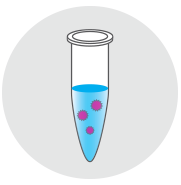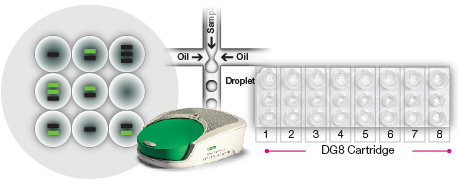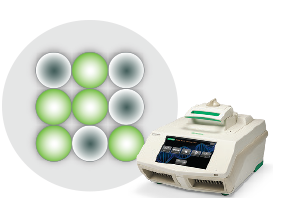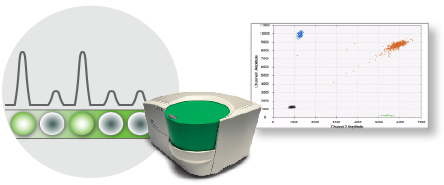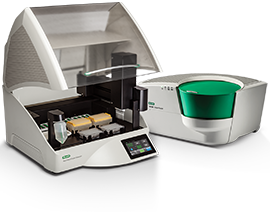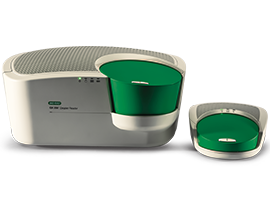
On This Page |
CAR-T Cell Monitoring by Droplet Digital PCR | Modified-Cell Counting with ddPCR | Droplet Digital PCR Systems |

Cell therapy has rapidly gained popularity in the immunotherapy world for treating cancer, but ensuring safety and effectiveness in patients is complex. Research and clinical laboratories around the world are utilizing Bio-Rad's ddPCR technology as a tool to overcome challenges with existing methods for a range of applications including CAR transgene quantification.
CAR-T Cell Monitoring by Droplet Digital PCR
CAR-T Axi-Cel ddPCR Assay
A recent publication (Fehse, 2020) described the development of a ddPCR assay for precise quantification of CD19-CAR-T cells down to 0.01% frequency from patients treated with Axicabtagene ciloleucel (Axi-cel)*.
Bio-Rad worked with Dr. Boris Fehse to make this CAR-T Axi-Cel assay available.
- Detect Axi-Cel CD19-CAR-T DNA
- Duplex with a reference copy number HEX assay such as RPP30
- Optimized for QX ONE and QX200 Droplet Digital PCR Systems
- For Research Use Only—Not for use in diagnostic procedures
How to order the CAR-T Axi-Cel ddPCR assay

Click the button below or go to
Bio-Rad.com/Axi-Cel-ddPCR
Log in to your Bio-Rad.com account; if you do not have an account, choose Register Today

Select Add to My Designs

Click Add Assay to Cart

Add to cart any reagents and consumables needed and check out
Other reagents required:

ddPCR Supermix for Probes, no dUTP (1863023)

Copy Number Assay: RPP30, Homo sapiens (dHsaCP2500350)
CAR-T Webinar

In-vivo monitoring of CAR-T cells using sensitive Droplet Digital PCR
Dr. Boris Fehse, Head of Research Cell and Gene Therapy University Clinical Hospital, Hamburg
Prof. Fehse relates how his team uses ddPCR to quantify Axi-cel and Tisa-cel CAR-T cell expansion and persistence after treatment. The ddPCR assay achieves highly precise and sensitive quantification without the resistance to PCR inhibition often seen with qPCR.
New WORKFLOW Count Modified Cells with the ddPCR Whole Cell DNA Workflow
Quantify transgenes or edits at single cell resolution
- Accurately measure the % of modified cells at the DNA level
- Robust sensitive detection enables low cell input requirement (100–1000 cells)
- Scalable solution with easy workflow and analysis
ddPCR Whole Cell DNA Workflow
Droplet Digital PCR Systems
Bio-Rad's Droplet Digital PCR Systems provide ultrasensitive and absolute nucleic acid quantification. Droplet Digital PCR is particularly useful for low-abundance targets, targets in complex backgrounds, or monitoring subtle changes in target levels that cannot be detected with real-time PCR.
QX ONE Droplet Digital PCR System
- Walk-away operation with integrated ddPCR workflow and 5 plate capacity
- Advanced multiplexing capability 4 four color channels
- Easy to use using large onboard touchscreen with simple run setup
- Regulatory compliance enabled by QX ONE Software, Regulatory Edition
QX200 AutoDG Droplet Digital PCR System
- Simplifies ddPCR workflow and ensures consistency
- Generates droplets for 96 ddPCR reactions in 45 minutes
- One AutoDG Instrument can supply 4–5 droplet readers
- HEPA-filtered enclosure reduces contamination risk
QX200 Droplet Digital PCR System
- Simple and easy-to-use workflow with 96-sample throughput
- Droplet partitioning reduces bias from amplification efficiency and PCR inhibitors
- Convenient assay design — standard curves are not required


